

The Open Source School Redefines Education in Italy. Translation by Nicole Stojanovska.
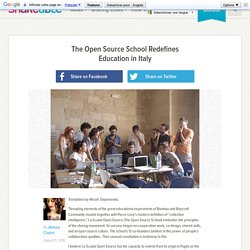
Threading elements of the great educational experiments of Bauhaus and Roycroft Community models together with Pierre Levy’s modern definition of “collective intelligence,” La Scuola Open Source (The Open Source School) embodies the principles of the sharing movement. Its success hinges on cooperative work, co-design, shared skills, and an open source culture. The school's 13 co-founders believe in the power of people's collaborative qualities. Their unusual constitution is testimony to this. I believe La Scuola Open Source has the capacity to extend from its origin in Puglia on the southern heel of Italy and inspire the acquisition of knowledge and educational development on a global scale.
What is La Scuola Open Source and what’s the idea behind it? We believe that, today, we live in a somewhat similar condition produced by the acceleration of technology and by the sudden economic slowdown. How do you apply your “educate to emancipate" motto? Why education continues to fail digital content (and students ready to embrace it) In her opinion piece for No Shelf Required, CEO of Metrodigi, Kathryn Stewart, gives three reasons why education has been slow to leverage the benefits of digital content: inferior user experience; shortage of engaging content; and lack of commitment to overcome institutional barriers.
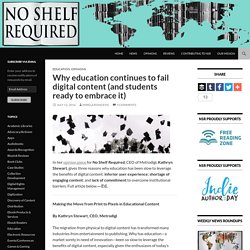
Full article below. —Ed. Making the Move from Print to Pixels in Educational Content By Kathryn Stewart, CEO, Metrodigi The migration from physical to digital content has transformed many industries from entertainment to publishing. As schools and universities are quickly being populated with digital natives, it’s essential that campuses keep up with their technology choices to keep students satisfied. I see the challenges/opportunities as three-fold: Much of the educational content available today does not provide a robust user experience. Digital textbooks, for example, are often little more than PDFs of the printed textbook under glass. The 50 Most Popular MOOCs of All Time. Twenty years ago, online education made higher ed exponentially more affordable and accessible. Today, MOOCs are poised to do the same. MOOCs – or Massive Open Online Courses – are picking up momentum in popularity – at least in terms of initial enrollment. Unlike regular college/ university courses, MOOCs can attract many thousands of enrollees around the world.
They can come in the form of active course sessions with participant interaction, or as archived content for self-paced study. MOOCs can be free, or there can be a charge – either on a subscription basis or a one-time charge. There are now thousands of MOOCs available worldwide from several hundred colleges, universities and other institutions of higher learning. All-time MOOC enrollment numbers are obviously a moving target. Some of the courses listed here have had no recent active sessions, and some do not have archived content. 50. Additional info: 49. 48. Additional Information: 47. 46. I heart intelligence Beat The System With This List Of 40 Free Educational Websites.
BrainRush. E-Learning Bookmarking Service - e-Learning Tags - Your Source for Social News and Networking. Black Mountain SOLE. Massively MOOC. MOOC.CA. DMLcentral.
Siemens_talk. 750 Free Online Courses from Top Universities. Advertisment Take online courses from the world’s top universities for free.
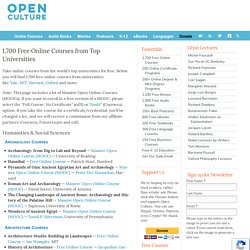
Below, you will find 1,700 free online courses from universities like Yale, MIT, Harvard, Oxford and more. Our site also features collections of Online Certificate Programs and Online Degree & Mini-Degree Programs. 625 Free MOOCs from Great Universities (Many Offering Certificates) MOOCmania. MOOCs, it seems, are driving us to distraction.
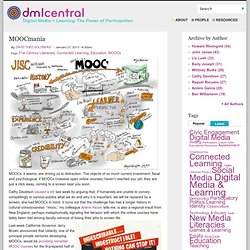
The objects of so much current investment, fiscal and psychological, if MOOCs (massive open online courses) haven’t reached you yet, they are just a click away, coming to a screen near you soon. Cathy Davidson caused a stir last week by arguing that, if humanists are unable to convey compellingly to various publics what we do and why it is important, we will be replaced by a screen; she had MOOCs in mind.
It turns out that the challenge has had a longer history in cultural consciousness: “mooc,” my colleague Arlene Keizer tells me, is also a regional insult from New England, perhaps metaphorically signaling the derision with which the online courses have lately been met among faculty nervous of losing their jobs to screen life. Resources for MOOCs (Massive Open Online Courses) This Web page was originally created to support the poster "Re-defining Delivery and Credentialing of Scholarship in the 21st Century" at the Massey University 2012 Vice-Chancellor's Symposium on 30 October 2012.
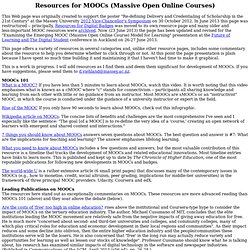
In June 2013 this page was restructured -- principally, Resources for Digital Badges was moved to its own resource page and many older and less-important MOOC resources were archived. Now (23 June 2013) the page has been updated and revised for the "Examining the Emerging MOOC (Massive Open Online Course) Model for Learning" presentation at the Future of Learning and The Digital Student conference in Auckland on 26-27 June 2013. This page offers a variety of resources in several categories and, unlike other resource pages, includes some commentary about the resource to help you determine whether to click through or not. At this point the page presentation is plain because I have spent so much time building it and maintaining it that I haven't had time to make it graphical.